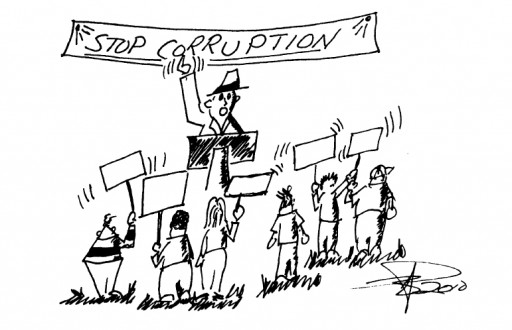Challenges in financing political parties
The financing of political parties always, for a reason, attracts a lot of public attention. Citizens rightfully seek to know how political parties manage their funds, as a preview into managing public finances, when or if elected, whether they are financed by majority donations from the private sector or by public money.
Public or private money?
It is the majority source of funding that makes the difference between political parties in the United States of America and political parties in Europe. In Europe, parties are mostly financed by public money, while in the USA they are mostly financed by donations from the private sector. I believe that the latter can negatively affect the public perception of the integrity of political parties.
This type of funding raises doubts among citizens about whose interests such political parties and their representatives represent. Do they represent the interest of private capital or the public interest? We have witnessed many examples from American politics of how the interests of private companies often take precedent over the public ones. Examples are the arms industry, the pharmaceutical industry or the oil industry.
Therefore, it is extremely important to maintain public funding of political parties as, at least, the primary source of funding because political parties themselves are an important part of every democratic society and must be free to form their political views without being threatened with loss of funding. Public financing certainly entails responsibility and transparency in its use. Also, in order for citizens to be able to justify public financing, it is necessary to define a legal framework that needs to be implemented. However, even the legal framework should not prevent political parties from introducing stronger mechanisms of transparency in their organizations.
Prerequisites for public money
Let's share what are the prerequisites that must be determined in order for citizens to have confidence in political parties and their financing. Obligations in this process are the responsibility of the state as the legislator, but also of the political parties themselves.
The state should:
a) enact a clear legal framework on election campaign financing and political party financing
b) determine the maximum amount of donations to political parties for companies and private individuals
c) introduce the obligation to publish financial reports for political parties
d) provide an independent body that controls the expenses for political parties
In addition to ensuring these preconditions, the state should also ensure the implementation and control of these regulations.
The more demanding part is the mechanisms that political parties should introduce in their ranks. First of all, the financial statements of a political party must be clear, detailed and publicly available to everyone.
Financial statements should contain detailed specifications of costs in order to leave no room for speculation. Also, a detailed list of all donors with donation amounts should be transparent and available. Moreover, it is very important that independent institutions from the state control the reported costs.
In this context, it is a common situation in Croatia that political parties do not report all expenses in their financial report. Checking the number of billboards, television commercials, approximate number of brochures and leaflets with the reported number in the financial report is a necessity. Unfortunately, these mechanisms are still at a low level in Croatia, and precisely because of this, the responsibility of political parties is even greater in order to increase their own integrity.
Responsibility of political parties
Furthermore, a political party should have clear procedures for the use of financial resources both by the party headquarters and its local organizations. Party funds cannot be decided exclusively by the party president. The financial plan for the following year should be adopted by the highest, collective body of the party.
The financial plan sets the framework for the following year, and the party should form a business committee headed by a person in charge of finances who takes care of spending financial resources under the control of the party's presidency. This type of mechanism enables a greater number of people to be involved in the decision-making process regarding the use of funds, thus reducing the possibility of manipulation and favoritism. Accordingly, the consumption of local organizations should be under the constant control of persons in charge of finance and the business committee. Procedures formulated in this way should be supported by additional control mechanisms in order to increase the level of transparency and avoid fraud.
Internal mechanisms must be clear, efficient and transparent and must include the party's collective bodies. Clearly defined internal procedures prevent broad interpretations. Efficiency makes it possible for the decision-making on the use of funds not to take too long, and every step should be transparent to the public.
In accordance with all of the above, a political party in its statute should clearly define disciplinary measures for individuals within the party who violate prescribed financial procedures. These disciplinary measures must not be decided by the business committee, but by a body separate from the decision-making process on the use of funds in order to ensure independence in decision-making.
Ethical dilemma
As this topic is mostly quite abstract, I will try to bring it closer with an example, and at the same time with an ethical dilemma. Let's imagine a hypothetical situation where you are the president of a party in a small municipality and local elections are coming up. You don't have a big budget for the elections, so you decide to print pre-election flyers. In the municipality where you operate, there are two business entities that can do this work for you. The owner of the first printing press is also an active member of your party, and the owner of the second printing press is an active member of the competing party in the following elections. You have collected offers and both owners offer the same price for the job. You have the freedom to decide who you will choose for the intended job. In that case, would choosing a member of your party for the job be a favor? Is it even necessary to collect bids in this situation? How to avoid potential deliberate profiteering in the election campaign?
Precisely because of such ethical dilemmas, which are not easy to answer, clear internal rules and collective decision-making are needed. This clear, yet simple, example clearly shows how important the internal procedures of a political party are in order to eliminate the possibility of favoritism as much as possible.
Transparency, transparency and transparency
In conclusion, transparency is a word that can often be heard in the political arena, but is rarely fully applied by political parties. If a political party is financed with public money, which we must be aware of at all times is the money of all citizens, then transparency must be maximized. Otherwise, trust in political parties as key actors of democratic systems is permanently eroded, and thus democracy as a social order is directly threatened.







